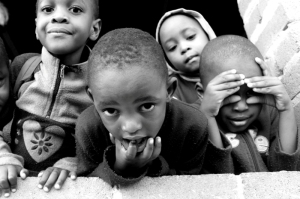“Jesus was not born here but sometimes he comes in through the little holes in the walls and sits on that chair” – Sandile Dikeni (Shack Chic)
An old man sits in a shaft of light at the front of the small mud hut; his brown hands clasp the spine of his battered bible, motes of dust gently orbit his head and the butter-yellow sunlight sets his hair aflame. This one-roomed, thatched mud hut is a church located in rural Nyathi, situated roughly an hour outside of Bulawayo. The old man is the church elder. The road to this village shows the many years of Mugabe’s rule: Dumi, a local urban pastor, laughingly refers to it as the Christian road because it requires a certain degree of sharing. All that remains of the road is a car width of pockmarked tarmac flanked on both sides by stony brown soil. Two cars race towards each other down the central median, and at what seems like the very last second, veer off on to opposite sides to let each other pass. Cyclists, chickens and pedestrians scatter to the left and right, skidding over the gravel and into the grassy verge, in a last ditch effort to avoid an untimely demise.
We are here to visit this small church, its elders and congregants. They do not often have visitors and we are welcomed with clapping hands and toothy smiles, and are then led down a path between straggly mielie plants to the tiny church. We all stoop to enter and are asked to sit on what turns out to be pews made out of mud packed around a wooden frame. The rich, red soil is sturdy and I am surprised that it carries the weight of three or more people. At the corner-edge of the pew I sit on, I notice a thin column of grainy sand standing about 15cm high, a nest of ants has fashioned this delicate tower, and it has somehow survived the many bodies which have sat here. The walls of the church are pitted and the backsides of noisy yellow bees waggle in and out of the holes. The room is scented with the smoke of a thousand fires, which has seeped into the mud on the walls, and soaked the clothes of the worshipers.
I can’t stop looking at the old man – his skin is lined and leathery, and whiskers grow out of his nose and ears. Both his hair and the stubble on his chin have grown grey. For all the years I have worked in rural areas, this is the first time I have seen such an old man. I am used to seeing young boys, teenagers and the occasional middle aged man. Even though apartheid in South Africa is long over, its legacy remains: men move to the cities to find work and seldom return, so the rural areas are populated by women and children. As each of us visitors stand to introduce ourselves, a small girl wanders over, and settles herself comfortably across the old man’s knees. I don’t know if this is her grandfather or simply a male relative she feels at home with. I feel quite overwhelmed as I watch her; there are few children in rural South Africa, and indeed many parts of South Africa, who will have this experience, as men are no longer central to family life.
As the small band of Christians begin to sing, the sun filters in through the small square windows at the front of the room, while the open doorway behind me reveals full purple clouds hanging over the mielie field and huts. It is 11am and the sky darkens as the thunder rolls and lightning streaks the sky. Fat drops hit the earth releasing fragrances long stored in the soft, loose soil. It has not rained for months and they say our visit has broken the long dry spell. I love the fact that I am sitting in a far away place; the roar of the city forgotten, its sounds replaced by the tinkling of cow bells and the wind sifting through the mielies.
Why are we here? We haven’t brought anything with us; in fact, it is our hosts who offer us delicious platefuls of pumpkin, mielies and squash, leaving the taste of honey and wood smoke on our tongues. So what is the point? As I listen to both Kent and Wessel, two team members, share and encourage this small church, I realise that sometimes it is simply being with people that is important. We travelled 1850km to sit and talk and share a meal together; most of us virtual strangers but linked by faith. Did we have to travel to Zimbabwe to do this? Could we not be doing it in some of our rural areas in South Africa? Yes, we could. But I know that our visit was important for these Zimbabweans; people in flux, people who are assured of very little in this life. We know of their plight, we know of their fears and they know that we care.
The days that follow are filled with various activities, and the meeting of people from all walks of Zimbabwean life. I spend a morning at a local orphanage which is home to a number of small, beautiful children; some were abandoned at birth – unclaimed by relatives after their mothers died giving birth, some were dumped in bushes or isolated places – left to die, one is paralysed from the waist down – involved in a hit-and-run and then given over to the State when the father was unable to care for her. The American’s travelling with us are here to tell the kids about Jesus and to tell them they have a great destiny. Sally asks them questions to gauge their knowledge and they answer with ease, even when I am stumped, and my lack of biblical knowledge becomes apparent to me. These kids are bright, they are funny and they love to dance – I don’t doubt they have a great destiny. In the hands of Jenni and the mothers of the orphanage, I can see that these kids are loved, and because of this they are gentle with each other. At lunchtime the older kids help the younger kids to sandwiches and juice, only helping themselves, once the small children are seated and fed.
That afternoon I find myself in an unfinished brick building in a suburb reminiscent of a South African township. We have been invited to attend a women’s meeting where we will share a few words with the ladies present. One of the many things I love about Africa are the voices of women in song – loud and clear they seem to carry all the sadness, love, jubilation and hope of Africa as a whole. I stand amidst a sea of singing women and my skin prickles and my eyes water. These women are so firm in their faith, so convinced of God’s love and as I watch them I get the same feeling that came over me in the tiny mud hut of a church in Nyathi – Jesus is here, perhaps sitting on a chair or leaning in the doorway. He’s not loud, he’s not the centre of attention – he’s just here.






